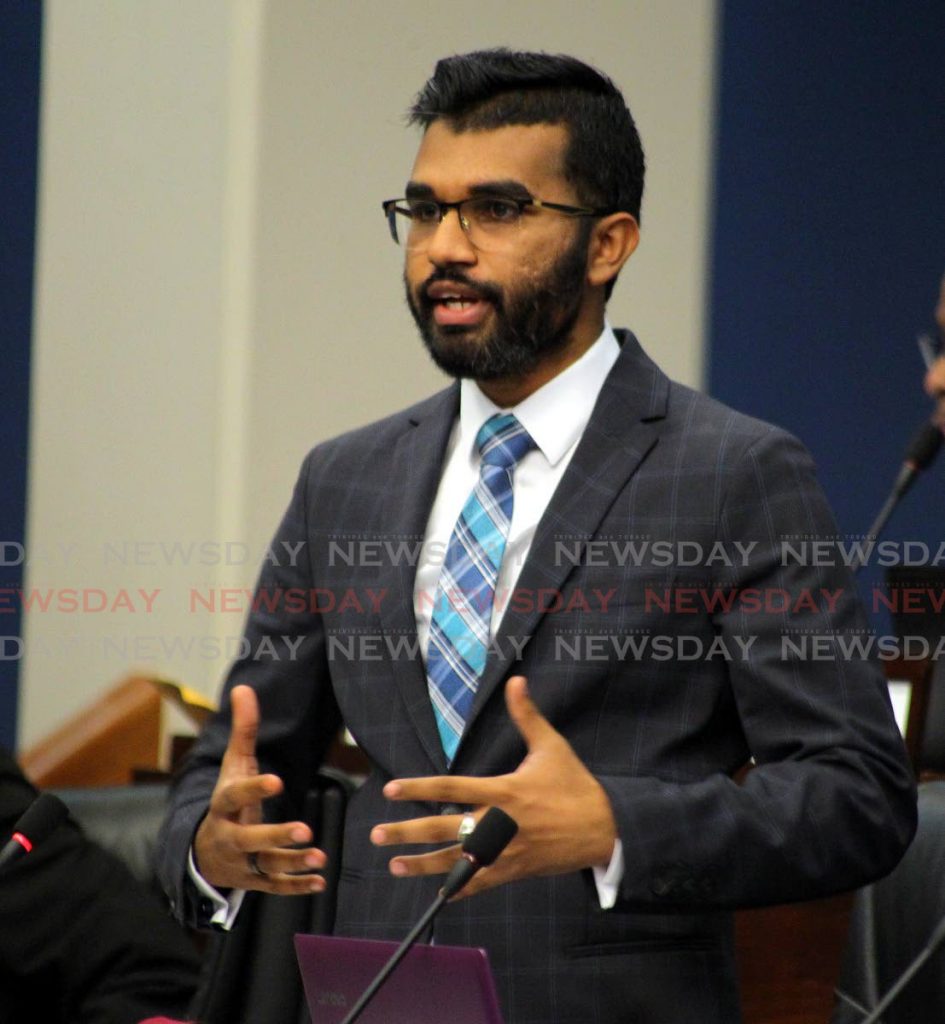Senator: Central Bank independence at risk

Opposition Senator Saddam Hosein is asking government to explain the urgency placed on amending the Central Bank and Proceeds of Crime Acts.
The amendments came after National Security Minister Stuart Young announced on Thursday that the country will be using a new polymer $100 bill from Monday. On Friday the House of Representatives unanimously passed a bill, Miscellaneous Provisions (Proceeds of Crime and Central Bank) Bill 2019, to replace the existing $100 bank note with the new polymer bill.
During a sitting of the Senate on Saturday, Hosein said the Opposition supported the Government in its aim but requested clarification on some issues, and raised others for its consideration.
He requested evidence, statistics on the levels of money laundering, counterfeiting and other underground activities, as to why Government wanted to make this switch so quickly and during such a busy economic time, Christmas.
He expressed disappointment that the date of cancellation of the present banknote was not announced, especially since Government did not wait until the usual sitting on Tuesday but rushed to have a special sitting on Saturday.
Hosein also expressed concerns about Section 27 (i) and the Central Bank’s independence. Currently it stated, “The bank, with the approval of the minister, may on giving three months’ notice published in the Gazette call in any of its notes and coins on payment of the face value thereof and any such notes or coins with respect to which a notice has been given under this section shall, on the expiration of the notice, cease to be legal tender, but shall be redeemed at face value by the bank upon such conditions as may be prescribed.”
In the new clause, the finance minister could direct the bank to demonetise a note or coin with a shorter notice period. “If the minister now directs Central Bank to do something it means you are chipping away or you are eroding at the independence of Central Bank... We will all appreciate in this House that the Central Bank is really the institution that is responsible for fiscal policy and fiscal management and monitory policy,” said Hosein.
He also questioned if it would truly stop money laundering, if it would prompt another trade, or encourage the use of other currency. He gave the example of Ghana where, after demonetisation, on the black market criminal elements simply used another currency that was traded in the jurisdiction. He also pointed out other territories where demonetisation led to the fall of governments, civil unrest, job losses, slower GDP growth, and other negative aspects.
Hosein also raised the concerns of Muslims who do not indulge in interest-bearing accounts. He said some Muslims keep their money at home, others may have been saving for years to make the holy pilgrimage which cost and average of $50,000 to $70,000, and they may not have proper records of their legitimate earnings to show “source of funds.”
Other business people such as taxi drivers, farmers, and people with parlours, as well as older people who keep their money at home could fall into that category. “It’s going to be difficult for these persons who have legitimate incomes and savings to now go to the bank and have their moneys exchanged because the bank’s policies are rigid.”
In addition he pointed out that in other territories, there had to be an upgrade of hardware and software of automatic teller machines and questioned if the commercial banks thoroughly consulted.
Independent Senator Deoroop Teemal said the amendments assumed that owners of “dirty money” keep their earnings in cash but many of the bigger criminals convert their money to tangible and intangible assets. He also said they usually conducted business in US dollars so the move may only mean a temporary loss for the “small fry.”
He said it could also create a new money laundering scheme of sub-contracting and sub-letting of cash where large amounts of money could be broken up and given to numerous people to be deposited and later returned in new banknotes to the original person for a small fee.
He said on an average month-end lines extend outside banks and people could be in line for over an hour. He therefore asked how the banks would engage with the public, if they would extend their hours or increase the number of staff.
He said the long lines would also be an opportunity for criminals to observe people and possibly follow them to their destinations to rob them of their new bank notes. He said a police presence at the banks, as well as additional patrols may be necessary.
Teemal also asked what mitigation efforts were in place to deal with any negative impacts of demonetisation. He suggested a public awareness and education campaign with clear, definitive guidance and instructions to lessen the anxiety of the public.


Comments
"Senator: Central Bank independence at risk"